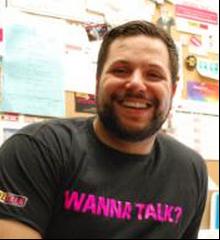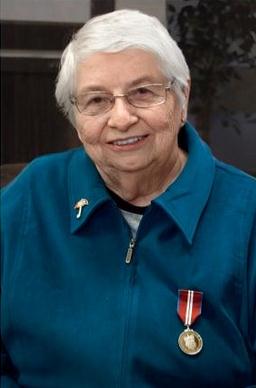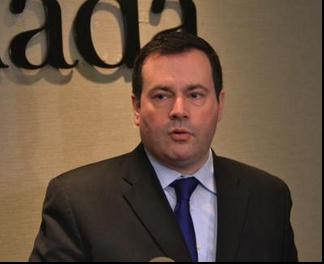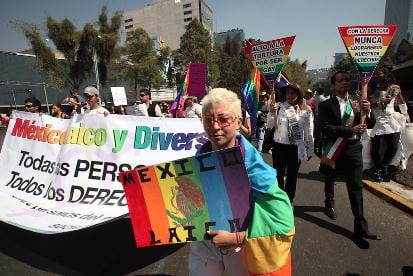
Marco Posadas, a gay Toronto psychotherapist originally from Mexico. Credit: Andrea Houston (file photo)

Chris Morrissey, of the Rainbow Refugee Committee. Credit: Leah Bromley photo

Ministry of Citizenship and Immigration Minister Jason Kenney. Credit: Xtra file photo
Activists are calling the Canadian federal government’s decision to add Mexico to its list of safe countries of origin a major concern for lesbian, gay, bisexual and transgender refugees trying to flee homophobic violence there.
Marco Posadas, a gay Toronto psychotherapist originally from Mexico, says the Ministry of Citizenship and Immigration is ignoring the reality of Mexico’s systemic discrimination against queer people.
“From my perspective this is a very bad decision,” he says. “And it has been made by an external authority who apparently has no clue what is actually happening in the country.”
Mexico was added to the government’s list of safe countries Feb 14. It is one of eight new nations, along with Israel (excluding Gaza and the West Bank), Japan, Norway, Iceland, Switzerland, New Zealand and Australia.
The government now considers 35 countries safe. The designation means these countries have been deemed to have the ability to protect citizens from discrimination, persecution and hate-motivated attacks. Any asylum claims from these nations will go through a new fast-tracked process, with no appeal on humanitarian grounds allowed if a claim is denied, thanks to recent changes included in omnibus refugee bill C-31.
Chris Morrissey, of the Rainbow Refugee Committee in Vancouver, says the changes will put people at risk.
“We know that Mexico is certainly not safe for many, many people,” she says. “It is particularly unsafe for members of the LGBT community. This is going to impact members of our community who need to flee.
“Now, if they are denied, they have no options at all. There’s one person who will make the decision, and it’s final.”
Posadas, who immigrated to Canada from Mexico City with his partner eight years ago, says many queer people stay closeted in Mexico.
“This is going to impact Mexican immigrants who want to come here seeking a better life or are running away from great difficulties, including instances where their lives may be at risk,” he says. “There are many parts of the country where it is not safe to be an out, gay activist or politically active. There are a lot of hate murders.
“I didn’t leave my country because I was running away from it,” he says, noting that although he did not come to Canada as a refugee, he has worked with Mexican refugees in Canada. “I was just seeking an opportunity, and Canada opened the door to me. Not everyone is as privileged as I was to have been able to work in safe spaces and go to university.”
According to the Youth Action Network, a non-profit organization focused on social justice issues, more than 1,000 gay people have been murdered in Mexico in the past 10 years, with little sign of justice.
Morrissey says Mexico and Hungary are at the top of the list of countries with the most refugee claims to Canada.
Citizenship and Immigration Minister Jason Kenney has previously told Xtra, and maintains, that the changes will cut back on the number of fraudulent claims clogging the system and slowing things down for “actual refugees.”
“He calls these bogus claims; therefore, they are using up far too many resources of the Canadian system,” Morrissey says. “We’ve already seen that the majority of Mexican claims are denied, those based on sexual orientation or gender identity, in Vancouver. Trans people have had more success, but gays and lesbians have not. The majority have been denied and people sent back.”
Morrissey, who has advised Kenney against the changes, suspects the Conservatives are moving toward lifting visa requirements for Mexican citizens seeking to come to Canada.
The visa requirement was imposed on Mexican visitors in 2009 after asylum claims tripled from 2005, The Globe and Mail reports. Mexico had become the top source country for asylum claims, with more than 9,000 claims annually. Only eight percent were accepted, according to statistics from the Immigration and Refugee Board.
Mexican officials have been lobbying for Canada to declare the country “safe” for some time. Last fall, during a visit by Mexico’s president, Prime Minister Stephen Harper pledged to do so.
The visa requirement appears to explain a dip in refugee claimants. In 2011, 6,095 claims were finalized and 17 percent were accepted, The Globe reports.
“People don’t leave their country and leave everything behind unless they’re desperate,” Morrissey says.
In 2010, same-sex marriage and same-sex adoption was legalized in Mexico City, leading many to believe that Mexico is gay-friendly.
“The law may say one thing, but the reality is very different,” Morrissey says. “What do you do if the police don’t protect you? And they are often the perpetrators of this violence.”
Despite advances, queer people continue to face social discrimination and human rights violations based on their gender identity and sexual orientation, the International Gay and Lesbian Human Rights Commission (IGLHRC) states.
“Mexico is a country of contrasts,” Posadas says. “You will see same-sex couples on the street holding hands, and there is nightlife and gay life in Mexico City. But once you go outside the city, you see a lot of hate crimes. It’s particularly difficult for trans people.”
A 2005 national poll on discrimination in Mexico shows that 48 percent of people interviewed said they would not live with a gay person in their home, and 11 percent would not hire a gay person, the IGLHRC reports. Also, 95 percent of gay people interviewed said they faced some degree of discrimination in Mexico.
Between 1995 and 2007, 464 homophobic and transphobic hate crimes were committed in Mexico, the IGLHRC reports. The human rights watchdog cites another study that indicates that 76 percent of queer people have been subjected to physical violence because of their sexual orientation or gender identity, and more than half had been assaulted in public spaces.
“My fear is that it will force migrant people to go undercover and not access services and not access support when they arrive in Canada,” Posadas says. “We are still going to look for an option to leave and work and love and build our lives. It makes people trying to migrate even more unsafe.”
Posadas says the discrimination stems, in part, from a culture with staunch Catholic beliefs.
“There is a lot of religious-based discrimination,” he says. “There’s also a lot of system oppression. It’s a male-privilege-dominant culture. There’s internalized racism, classism.”
That aggression has also manifested in an epidemic of drug-related violence. A 2011 report by Amnesty International notes there were more than 15,000 gang-related killings in Mexico that year.
“Our position has been that Mexico the country is in such disarray because of the drug cartels that are taking over that the law enforcement is not able to cope with, and they certainly won’t offer protection to LGBT citizens,” Morrissey says. “For members of the LGBT community, this is a disaster.
“It totally negates the reality of queer people there,” she says.

 Why you can trust Xtra
Why you can trust Xtra


